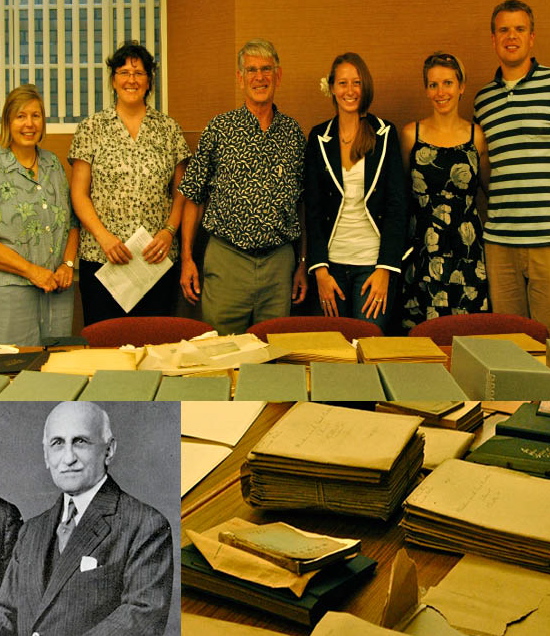
Since the end of World War II, the timeworn trunk sat idle in an attic with its treasures cloaked from the outside world.
Fast-forward 66 years and the trunk has found a new home in the basement of Love Library.
“Nobody really knew much until we opened this box,” said Gwyneth Talley, a senior language studies and history major. “All I knew was there were original manuscripts that had been unpublished.”
For more than two years, Talley has been researching the works of professor Fred Morrow Fling as part of a UCARE project for UNL’s Archives and Special Collections department. Talley was able to contact Fling's grandson, who donated a trunk of papers and items from the late professor.
Fred Morrow Fling taught at the university from 1891-1934 and was devoted to the study of Honoré Mirabeau, a French diplomat and politician who was a crucial voice during the French Revolution.
“I learned how to read French better and developed a greater understanding for his research methods,” Talley said. “We’re going to be big leaders in French Revolution knowledge now that we have his notes on those primary documents.”
The trunk was donated to the university by Rodger Fling, grandson of the late professor. Rodger Fling didn’t know what the trunk contained until it was opened during the donation transaction on Sept. 1.
“It’s been fascinating to read a lot of the personal letters to (his wife) Helene that explained his experiences in Europe,” Rodger Fling said.
A world traveler, professor Fling ventured abroad to unearth primary documents that supported his life’s work on Mirabeau and the revolution. At the time, using first-person accounts of history as a means of research was unexplored territory.
“He was famous for being an ardent advocate of using primary resources in the classroom,” said Joan Barnes, development and outreach librarian.
Fling’s primary resource approach to research became known as the "Nebraska method," and the source method as it’s now referred to by countless academics and students across the world.
“I hope it’s all put to use because all of these papers were his life work,” Fling said. “It would be a waste for these materials to not be studied by historians and scholars.”
Open archives are a part of the philosophy of teaching at UNL, with students having special access to thousands of primary sources ranging from maps and diaries to entire book collections, including Fling’s own personal library.
“The Fling materials could change everything because no one’s ever seen them,” said Mary Ellen Ducey, UNL Libraries associate professor. “Just like Cather’s materials did.”
Although there’s no confirmed evidence that Willa Cather was one of Fling’s students, the writer is said to have based two characters on him in her novels “One of Ours” and “The Professor’s House.”
“Professor Fling comes up quite often for his method and there were many pockets to his experience,” Ducey said. “Now that the materials are here, we can promote them and ideally reach many departments within the university.”
Talley played an integral role in guiding the Fling materials to UNL by contacting the professor’s son, Wentworth Fling, back in 2009.
“What Gwyneth wanted to discover during her project was if there were more of his papers that existed and that if any descendants who were still living had them,” Barnes said.
Talley initiated a conversation between Wentworth and UNL to discuss the logistics of getting the trunk donated to the university. Unfortunately, Wentworth passed away in August 2010 and the process came to a standstill.
“We continued the conversation with Wentworth’s daughter Margaret and son Rodger,” Barnes said. “They agreed that their grandfather’s materials should come home to UNL.”
With the trunk unlocked and the stacks of yellowed paper ready for analyzing, it seems fitting that the works of a man who dedicated his life to the use of primary sources should return to the place where it all began.
“A student got to have a big impact on bringing new primary source materials to the archives about the man who pioneered using primary sources in research,” Barnes said. “Everything is coming full circle.”
To see additional photos from the Sept. 1 donation, visit The Scarlet's Facebook page at http://facebook.com/ScarletUNL
— Mekita Rivas, University Communications